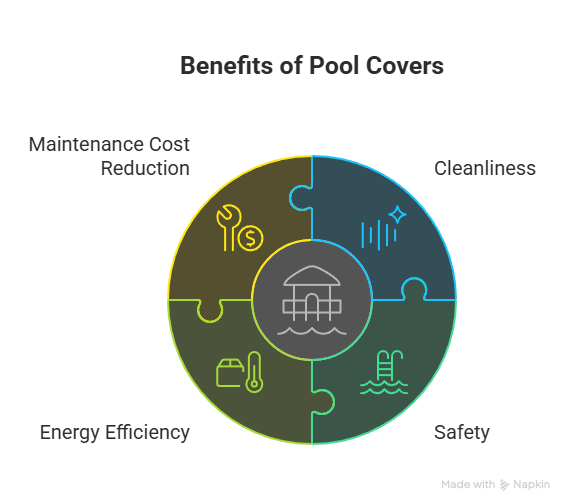Ultimate Guide to Pool Covers: Types, Benefits, and Selection TipsUltimate Guide to Pool Covers: Types, Benefits, and Selection Tips
Are you wondering how to keep your pool clean, safe, and energy-efficient? A swimming pool cover might be the solution you’re looking for. Pool covers serve multiple purposes – from heating your water to preventing accidents and reducing maintenance costs.

Key Takeaways
- Safety first: Proper pool covers can support the weight of an adult and prevent accidents
- Cost savings: Covers reduce water evaporation, chemical use, and heating costs
- Variety matters: Different types serve different needs (solar, safety, automatic, winter)
- Quality counts: Look for ASTM-certified covers with proper thickness and UV protection
- Maintenance required: Regular cleaning and proper storage extend cover lifespan
What Are Pool Covers and Why Do You Need One?
Understanding Pool Cover Functionality
Pool covers act as a protective barrier for your swimming pool. They keep out debris, reduce evaporation, and some even heat your water. Think of them as a shield that protects your pool investment.
Have you ever wondered how much water your pool loses to evaporation? Without a cover, you could lose up to 30% of your pool water monthly! This means more water to replace and more chemicals to add.
Key Benefits of Using Pool Covers
Swimming pool covers offer numerous advantages:
- Reduce water evaporation by up to 95%
- Cut chemical usage by 35-60%
- Decrease cleaning time and effort
- Extend your swimming season
- Improve safety for children and pets
- Lower energy costs for heated pools
How Pool Covers Impact Pool Maintenance
With a good cover, you’ll spend less time skimming leaves and bugs from your pool. You’ll also use fewer chemicals since the sun won’t break them down as quickly. Isn’t it nice to spend more time swimming and less time cleaning? 😎
Types of Swimming Pool Covers Explained
Solar Covers: Harnessing the Sun’s Power
Solar covers (sometimes called bubble covers) look like bubble wrap for your pool. They trap heat from the sun and transfer it to your pool water, raising temperatures by 8-10°C on sunny days.
These covers typically cost between R30-R80 per square meter, making them one of the most affordable options. While they provide basic protection, they aren’t safety-rated for preventing falls.
Safety Covers: Maximum Protection for Your Pool
Swimming pool safety covers are the gold standard for protection. Made from strong mesh or solid materials, they can support the weight of an adult (over 200kg) and prevent accidental drownings.
These covers meet ASTM F1346-91 safety standards and use anchoring systems that lock into your pool deck. They’re perfect for families with children or those who want peace of mind during the off-season.
Automatic Covers: Convenience at the Push of a Button
For ultimate convenience, automated pool covers operate with the touch of a button. These motorized systems roll and unroll your cover automatically, making daily use practical.
While they represent the highest investment (R15,000-R50,000 depending on size), they also offer the greatest convenience and protection when used consistently.
Winter Covers: Seasonal Protection Solutions
If you close your pool for winter, a dedicated winter cover provides seasonal protection. These covers are typically more durable than solar covers but less expensive than safety covers.
Many winter covers use water bags or weights to secure the edges, though modern versions may use spring-loaded mechanisms for better anchoring.
Alternative Options and Their Limitations
Can you use a tarp as a swimming pool cover? While tempting for budget reasons, regular tarps aren’t designed for pools. They collect water on top (creating drowning hazards), tear easily, and lack proper anchoring systems. The small savings aren’t worth the risks.
Material Specifications and Quality Considerations
Thickness and Durability Standards
Quality pool covers are measured in mil thickness (1 mil = 0.001 inch):
- Economy covers: 8-10 mil
- Standard covers: 12-16 mil
- Premium covers: 16+ mil
The thicker the material, the longer your cover will last, but the heavier and more expensive it becomes.
UV-Resistant Treatments and Longevity
South Africa’s strong sun can destroy pool covers quickly. Look for covers with UV inhibitors that prevent degradation. A good UV-treated cover might last 5-7 years, while untreated ones may need replacement after just 1-2 seasons.
Mesh vs. Solid Materials: Pros and Cons
| Material Type | Pros | Cons |
|---|---|---|
| Mesh | Allows rainwater through, lighter, easier to handle | Some debris may pass through, less heat retention |
| Solid | Complete debris blocking, better heat retention | Water can pool on top, heavier, requires drainage |
ASTM Safety Certifications to Look For
For true safety covers, look for ASTM F1346-91 certification. This ensures the cover can support a specific weight and has been tested for safety standards.
Selecting the Right Pool Cover for Your Needs
When choosing a swimming pool cover, consider:
- Your primary goal (heating, safety, debris prevention)
- Your budget (from R3,000 for basic covers to R50,000+ for premium automatic systems)
- Your pool shape (custom shapes cost more)
- Your climate (coastal areas need more UV protection)
- How often you’ll use the cover (daily vs. seasonal)
Pool Cover Safety Features
Safety should be your top priority, especially if you have children or pets. A proper swimming pool safety cover should:
- Support at least 200kg of weight
- Secure firmly to your pool deck
- Have no gaps larger than 10cm where a child could slip through
- Include a locking mechanism for automatic covers
- Allow quick removal in emergencies
Looking for a swimming pool cover roller to make handling easier? These devices (R2,000-R5,000) can make manual covers much more convenient to use.
Conclusion: Making the Best Pool Cover Decision
A quality pool cover is an investment that pays for itself through water and chemical savings, reduced cleaning, and added safety. Choose based on your primary needs, and remember that the best cover is the one you’ll actually use consistently.
Need help finding swimming pool covers near me? Visit Swimming Pool Builders to connect with local professionals who can help you select the perfect cover for your pool.


